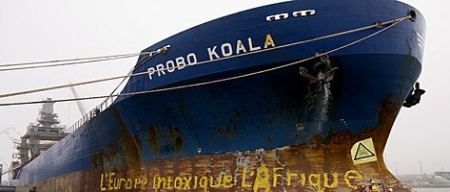Brussels, 10 October 2008: Two years after the scandal of uncontrolled dumping of hazardous wastes in Abidjan, Ivory Coast, which killed 17 people and affected more than 100,000, the “Probo Koala” trial has just opened - without the presence of either of the main responsible parties: the Dutch enterprise Trafigura (which chartered the ship) and the Abidjan Port Authority.
The facts: On 19th August 2006 a ship (the Probo Koala) chartered by a Dutch company offloaded 400 tons of gasoline, water and caustic washings used to clean oil drums. The cargo was dumped at Akouedo and at least 10 other sites around the city, including in a channel leading to a lake, roadsides and open grounds. Seventeen people died and close to 100,000 others sought treatment since the toxic wastes were dumped on open-air sites around Abidjan.
These wastes are regulated by the Basel Convention, which engages its signatories to treat wastes as close as possible from the production site, and in appropriate installations. Unfortunately the Convention does not have a compliance mechanism, so it can be ignored by irresponsible enterprises in order to send toxic waste to developing countries.
The International Trade Union Confederation calls for those responsible for this human and environmental catastrophe be brought to account, and demands the urgent decontamination of the sites, which continue to endanger their surrounding communities.
In addition, the ITUC is calling for a two-pronged approach in the international governance of hazardous wastes. First, there is a need to strengthen the Basel Convention and to close the legal loopholes that allow hazardous wastes to be transferred to developing countries. Secondly there is a need for improving developing countries’ capacities to implement relevant Instruments and Conventions, so as to enable effective responses to emergencies and protect the health and environment of workers and inhabitants.
For more information on ITUC activities on OHS or Sustainable development, please contact our Policy Officer on: +33 1 55 37 37 35 or at [email protected]
The ITUC represents 168 million workers in 155 countries and territories and has 311 national affiliates.
For more information please contact the ITUC Press Department on +32 2 224 0204 or +32 476 621 018.


